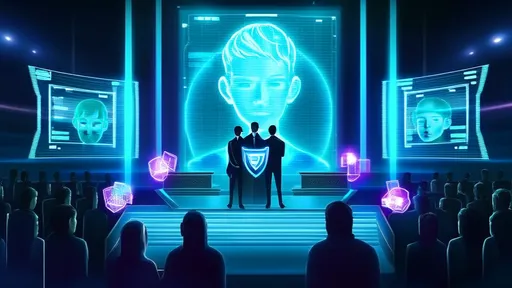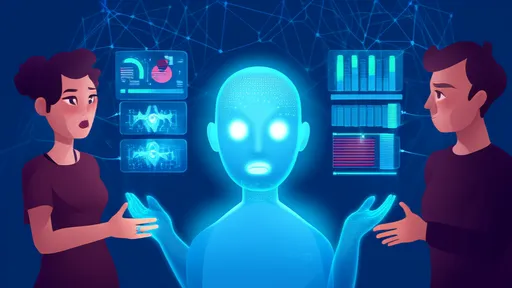The concept of human communication has undergone countless transformations throughout history—from spoken language to written scripts, from telegraphs to smartphones. Yet, none of these advancements have challenged the fundamental nature of how we convey thoughts as profoundly as the emergence of brain-computer interfaces (BCIs). Recent experiments in post-linguistic social interaction suggest that BCIs might not just augment communication but entirely redefine it, bypassing language itself to transmit raw thought. The implications are staggering, forcing us to reconsider what it means to truly "speak" to another person.
At the heart of this revolution lies the ability of BCIs to decode neural activity and translate it into digital signals. Unlike traditional communication, which relies on the slow, linear process of encoding thoughts into words, BCIs promise a direct conduit between minds. Early experiments have demonstrated that participants can share simple concepts—like shapes or emotions—without uttering a single word. This isn’t telepathy in the sci-fi sense, but a data-driven approximation of it, where algorithms interpret brain patterns and reconstruct them for another mind to receive.
One of the most striking findings from these trials is the erosion of linguistic barriers. Language has always been both a bridge and a bottleneck; it connects us but also distorts meaning through cultural nuances and imperfect vocabulary. BCIs, however, operate in a pre-linguistic space, where ideas exist before they’re filtered through grammar or syntax. In theory, this could eliminate misunderstandings born from translation or ambiguous phrasing. But it also raises a provocative question: If we circumvent language, do we lose something essential about human connection—the artistry of metaphor, the rhythm of dialogue, the pauses between words?
The ethical dimensions are equally complex. Without the deliberate pace of speech or writing, thoughts could become dangerously unfiltered. Imagine a world where anger, jealousy, or prejudice is transmitted instantaneously, before the sender has a chance to self-censor. Social norms rely on the delay between impulse and expression; BCIs might collapse that buffer, leaving relationships more volatile. Conversely, the technology could foster unprecedented empathy by letting people experience each other’s emotions directly—a double-edged sword with no historical precedent.
Then there’s the matter of identity. Language isn’t just a tool; it shapes how we perceive ourselves. Our inner monologues, the way we narrate our lives, are steeped in the languages we speak. If BCIs marginalize verbal communication, will our sense of self become more abstract, less tied to the stories we tell? Early adopters of BCI prototypes report eerie shifts in consciousness—moments where they no longer "think in words" but in pure concepts. This hints at a cognitive evolution that could diverge sharply from millennia of linguistic tradition.
Economically and politically, the stakes are colossal. Whoever masters BCI-mediated communication first could wield immense power. Governments might face crises if citizens can share thoughts beyond the reach of censorship; corporations could mine neural data to manipulate desires at their source. The very notion of privacy would require reinvention, as the most intimate space—the human mind—becomes technically accessible. Legal systems, meanwhile, would grapple with questions like: Is a transmitted thought equivalent to speech? Can you prosecute someone for an involuntary mental impulse?
Despite these challenges, the allure of post-linguistic communication is undeniable. For individuals with speech disabilities, BCIs offer liberation from biological constraints. For creative collaborators, they could enable seamless fusion of ideas. And on a species level, this technology might finally let us answer the age-old question: Is my experience of the world the same as yours? By sharing perceptions directly, we could discover universal commonalities—or irreconcilable differences—in how human brains construct reality.
The experiments are still crude, of course. Current BCIs can’t transmit the richness of a memory or the nuance of a philosophical argument. But the trajectory is clear: We’re approaching a threshold where communication transcends its ancient reliance on symbols. Whether this leads to utopian understanding or dystopian chaos depends entirely on how we navigate the uncharted territory between thought and technology. One thing is certain—the era of language as we know it is ending, and what comes next will redefine humanity itself.

By /Jul 28, 2025

By /Jul 28, 2025

By /Jul 28, 2025

By /Jul 28, 2025

By /Jul 28, 2025

By /Jul 28, 2025

By /Jul 28, 2025

By /Jul 28, 2025

By /Jul 28, 2025

By /Jul 28, 2025

By /Jul 28, 2025

By /Jul 28, 2025

By /Jul 28, 2025

By /Jul 28, 2025

By /Jul 28, 2025

By /Jul 28, 2025

By /Jul 28, 2025

By /Jul 28, 2025

By /Jul 28, 2025

By /Jul 28, 2025